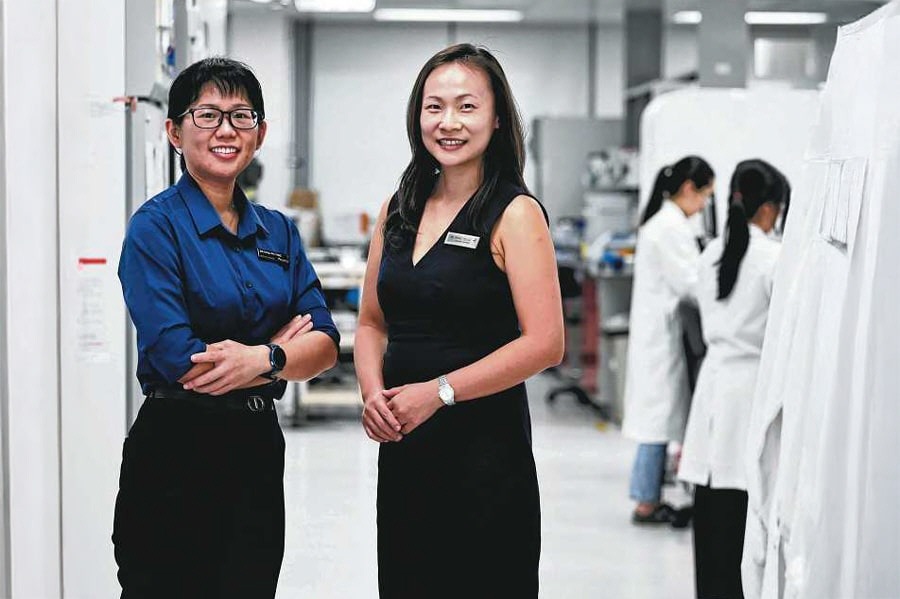The Straits Times (21 July 2025)

The study’s lead investigator in Singapore, Assistant Professor Chia Po Ying (at left) with Dr Zhong Youjia, another investigator on the study. Researchers hope to enrol at least 700 healthy children between the ages of two and 17 in the study, including both those who have previously contracted dengue and those who have never had the disease. ST PHOTO: KELVIN CHNG
A phase three
clinical trial is being conducted here to evaluate the safety and efficacy of a new quadrivalent dengue vaccine in children aged two to 17.
Developed by US-based pharmaceutical firm MSD, V181 is a single dose vaccine that aims to provide protection against all four serotypes, or strains, of the dengue virus.
Phase three clinical trials are typically the last stage of testing before a drug’s details and clinical trial results are submitted to the regulatory authorities for approval.
The study’s lead investigator in Singapore,
Assistant Professor Chia Po Ying, noted that V181 is a live-attenuated vaccine, which uses weakened versions of all four
dengue serotypes.
“Using the weakened forms of all these four dengue serotypes stimulates a human immune response to create protection against dengue infection in future,” said Prof Chia, who also heads the
National Centre for Infectious Diseases Research Office.
The new study here hopes to recruit at least 700 healthy children between the ages of two and 17, including both those who have previously contracted dengue and those who have never had the disease, said Dr Zhong Youjia, another investigator on the study.
This particular study focuses on children as they are more vulnerable to dengue and are also at a greater risk of severe infection, said the associate consultant at National University Hospital’s (NUH) Khoo Teck Puat – National University Children’s Medical Institute.
Side effects from the vaccine have been mild and short-lived, said Prof Chia, noting that they include muscle aches and fatigue.
“There have been no serious adverse events linked to vaccination with V181 to date, and the previous trials actually have shown a very good and favourable safety profile,” Prof Chia said.
A third recruitment site, KK Women’s and Children’s Hospital, is also in the works.
As at July 12, there have been 2,816 dengue cases recorded here in 2025, according to figures from the National Environment Agency (NEA).
In May, NEA noted that the number of dengue cases recorded here between January and May 2025 has dropped by about 74 per cent from the same period in 2024.
Worldwide, the study aims to enrol about 12,000 healthy children, also between the ages of two and 17, who will receive either a single dose of V181 or a placebo.
It aims to include more than 30 trial sites in dengue endemic areas in the Asia-Pacific, including Indonesia, Malaysia and the Philippines.
Developing effective dengue vaccines has been difficult as the four serotypes are effectively four different viruses, said Prof Chia.
While getting infected by one serotype grants lifelong protection against that particular strain, it provides only short-term protection against the other three, she said.
This short-term protection eventually wanes, she noted, adding that those who contract dengue more than once risk antibody-dependent enhancement – a phenomenon where antibodies that are generated due to a vaccine or prior infection actually increase the severity of an infection.
Dr Zhong noted this can result in dengue shock syndrome, otherwise known as dengue haemorrhagic fever, a potentially lifethreatening complication with symptoms including circulatory failure.
Designing a dengue vaccine has been challenging as it has to take into account this phenomenon, Prof Chia said.
Should the trials be successful and the vaccine meet regulatory requirements, V181 could be commercially available as early as within the next three to five years, said Dr Zhong.
Dr Paula Annunziato, senior vice-president for infectious diseases and vaccines global clinical development at MSD Research Laboratories, noted that half the world’s population live in areas at risk for dengue.
“If successful, V181 could provide an important single-dose option for at-risk populations, regardless of previous exposure to dengue, to help reduce the significant burden around the globe,” she said.
Dengvaxia, developed by Sanofi Pasteur, is currently the only dengue vaccine approved for use in Singapore.
However, it is available only for those between 12 and 45 years old who have previously been infected and poses an increased risk of causing severe dengue in those who have never been infected.
In May 2024, another quadrivalent vaccine, Qdenga, received prequalification from the World Health Organisation (WHO) – a process that aims to ensure the safety and efficacy of treatments – with WHO recommending the vaccine’s use for children aged between six and 16 in dengue-prone areas.
Developed by Japanese pharmaceutical company Takeda, Qdenga was made available in Malaysia in June 2024.
Qdenga was submitted for approval here in 2022.
However, the following year, the Health Sciences Authority said Takeda had withdrawn its application.
The authority said then that the company could submit another application with further clinical data on the vaccine meeting the “required safety, efficacy and quality standards for use locally”.
Source: The Straits Times © SPH Media Limited. Permission required for reproduction.